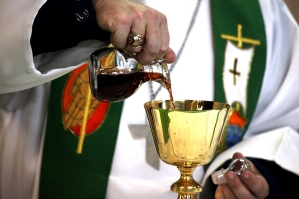
Decades of hostility by organized crime toward the Catholic Church in Italy allegedly surfaced anew when a priest who had received death threats found bleach in wine he was about to serve for Holy Communion.
The Rev. Felice Palamara of San Nicola di Pannaconi Church in Cessanti, in the southern region of Calabria, on Feb. 24 noticed a chemical smell while pouring water and wine into a chalice. He stopped the Mass and told his parishioners there was a problem.
Police later confirmed the presence of enough bleach in the vessels containing the wine to have killed the priest, according to the Observatory on Intolerance and Discrimination Against Christians in Europe (OIDAC). Police suspect local mafia of attempted murder.
Palamara, who has since publicly voiced forgiveness for the attack, had previously received death threats via anonymous letters in his mailbox, according to OIDAC. His car, parked near the church building, was also vandalized on two occasions.
“My revenge is called love, my shield forgiveness, my armor mercy,” Palamara wrote on Facebook. “Whatever has been done, for me he is and will remain this brother who can only be loved, even if justice must take its course.”
The priest also expressed support for the local community.
“I’m sure that this act of intimidation has nothing to do with my parishioners, because I have been here for 10 years, and I have always had good relations with the people of the parish,” he told local newspaper Corriere della Sera.
Italy’s military police, the Carabinieri, launched an investigation, and Palamara was under 24-hour police surveillance. He suffers from both asthma and a heart condition, according to the Catholic Herald.
Local mafia are suspected as the “most probable explanation,” according to OIDAC.
Also in Cessanti, a dead cat was recently left on the hood of the car of the Rev. Don Francesco Pontoriero, along with threatening letters, according to OIDAC.
On the same night that Palamara’s Communion wine was poisoned in Cessanti, nearly 440 kilometers (273 miles) north in Caserta an arsonist set fire to the car of the Rev. Marcos Aparecido de Goes, which was parked near the San Germano Bishop in Sant’Andrea del Pizzone parish building. Video footage obtained by police clearly show a perpetrator pouring flammable liquid onto the Hyundai car.
Mayor Sergio Tessitore of Francolise condemned the attack and blamed Camorra Mafia. Residents in Caserta subsequently held a solidarity parade for the priest.
The attacks follow decades of mafia hostilities toward the Catholic Church in Italy. The Rev. Raymond J. de Souza, in commentary for the National Catholic Register in August, recalled that mafia bombings plagued Italy in the early 1990s in response to a national criminal justice campaign opposing organized crime.
In 2018, Pope Francis told criminal factions they could not “believe in God and be mafiosi.”
The pope made the comment while paying homage the Rev. Giuseppe Puglisi, shot dead on his doorstep by the mafia in Piazza Anita Garibaldi 5, Sicily on Sept. 15, 1993 – the date of his birthday, according to the BBC.
In an address at Palermo’s Piazza Europa, the pope paid tribute to the slain priest, saying Puglisi helped young people steer clear of drugs and mafia lifestyles.
“A person who is a mafioso does not live as a Christian, because with his life he blasphemes against the name of God,” Francis said, pleading with the criminals, “Change, brothers and sisters! Stop thinking about yourselves and your money... Convert yourselves to the real God.”
On July 28, 1993, the cathedral of St. John Latheran Basilica, the official papal seat in Rome, was bombed within minutes of other explosions near the city cathedral in Milan, which killed five people and injured many others.
A prior assassination had led to the St. John Latheran Basilica bombing. A judge and devout catholic, Rosario Livatino, had worked on a mass trial against mafia members that led to his Ford Fiesta car being sprayed with bullets as he drove to work in Agrigento, Sicily, on Sept. 21, 1990.
When Pope John Paul II met the judge’s parents during a visit to Sicily in 1993, he held an outdoor Mass in the Valley of the Temples in Agrigento in which he lambasted mafia figures.
“In the name of Christ, crucified and risen, of Christ who is the way, the truth and the life, I say to those responsible: Convert!” John Paul shouted. “The judgment of God will come!”
The bombing of St. John Lateran took place three months later, reportedly in response to the former pope’s comments.
On July 27, 2023, Italian Prime Minister Giorgia Meloni paid tribute to the victims to mark the 30th anniversary of the 1993 bombings.
“Over the last 30 years, our nation has come to realize that mafia groups can indeed be defeated,” she said in a statement on the Italian government’s website. “The Italian state and institutions have been able to translate this awareness into a body of legal, technical and operational instruments that have made it possible to combat the mafia phenomenon, making Italy a model at international level.”
Fighting the mafia is a moral issue that guides the government’s daily actions, she said.
“It is the compass that guides our work and allows us to continue along the path of adapting anti-mafia legislation, making it more and more effective and able to respond to the new challenges of organized crime.”
Regarding the attempted poisoning in Cessanti, Bishop Attilio Nostro also saw the hand of organized crime.
“The diocese is living through a period of suffering due to acts of intimidation that have nothing to do with the normal Christian life of parishes,” Nostro said in a public statement. “For this reason, I appeal anew to the Christian communities not to be discouraged by this language of violence. We must not cede to this logic, allowing ourselves to be tempted by unease and by anger.”





